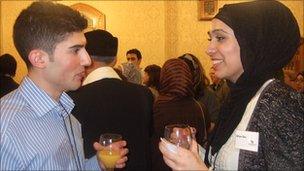Muslims and Jews join forces to tackle religious hatred
- Published

Jewish student Mark Robins and Muslim student Aliya Dinat the launch of Campus Ambassadors
Jewish and Muslim students are joining forces to tackle anti-Semitism and Islamophobia on university campuses - in a bid to spread a message of tolerance.
One of those with first-hand experience of religious hatred is Yassir, who as a student in 2004 was abused as he set off for his mosque in London. Four teenagers spat at him and called him "Bin Laden".
Shortly afterwards, he was beaten up, which left him in a coma for days. He is now paralysed on the left side of his body, and will need care for the rest of his life.
His story was recorded by the Islamic Human Rights Commission in a report in December 2006. It is not an isolated incident.
Ambassadors
Safia, 35, from London, was eating at a restaurant in 2004 when a man started to taunt her because she was wearing a jilbaab and scarf.
He then grabbed her, and started hitting her. Eventually a police officer intervened, and the attacker was arrested.
Safia has told researchers the physical scars have gone, but the mental ones are still with her.
The Muslim community is not alone in facing such attacks.
Two men wearing balaclavas threw eggs at some Jews walking to a synagogue in Manchester, according to a Jewish charity called the Community Security Trust.
In another incident reported to the charity a Jewish student was attacked in Leeds in 2009 by a group of men, who shouted "Get the Jew", before throwing snowballs at him.
In an effort to prevent more of these attacks, Jewish and Muslim students have come together to unveil Campus Ambassadors.
This team of Muslim and Jewish students will work on campuses around the country to try to improve relations between the two faiths.
The scheme has been put together by a charity called the Coexistence Trust.
One of the managers is 23-year-old Shahnaz Ahsan. She used to be a student at Oxford University, and believes there is a lot of tension between the two groups because of the Middle East conflict.
"What we are hoping to do through the Coexistence Trust is actually create a platform where Muslim and Jewish students can get a chance to interact with each other, get to know each other on the basis of students being students," she says.
Each of the ambassadors will undergo a one-year leadership development programme, and also get training in conflict resolution.
Bleak picture
Mark Robins, 20, went to a Jewish secondary school. He had virtually no contact with Muslim students while he was growing up.
That all changed when he arrived at Birmingham University. He hopes he can change opinions in his own community about Muslims.
"From time to time you'll talk to other Jews, and you'll talk about the Islamic Society and there'll be negative responses. I want to change all that," he says.
"I want to ensure that there is a good future for Jews and Muslims, to bring them together to co-exist and live in peace - hopefully that will reverberate to other countries, maybe the Middle East"
"People can sometimes cling on to anti- Semitism and Islamaphobia and it's a terrible thing, I think it's horrific, I think Islamaphobia is just as abhorrent as anti-Semitism and it all needs to be stamped out in all forms," Mr Robins added.
A survey produced in 2005 by Fosis, the Federation of Student Islamic Societies, found that almost half of Muslim students had experienced Islamophobia, mostly defined as "direct and verbal".
It also found that a quarter of these incidents had taken place on university campuses.
It is in the process of putting together a new survey which will be out this year.
The Community Security Trust reported 97 incidents of anti-Semitism in higher education in 2009, up from 68 the previous year.
Of those, 79 were on campuses. There were four assaults and other incidents ranged from verbal abuse to attacks on property.
All of this seems to paint a pretty bleak picture for both communities.
Away from tensions around the Middle East, inviting speakers on to campuses is also leading to problems.
Carly MacKenzie from the Union Of Jewish Students (UJS) says: "Hate speakers that spout anti-Semitism invited on to UK campuses by Islamic societies are one of the biggest perpetual problems currently facing Jewish students and one that UJS is working with the higher education sector to alleviate."
Major effect
On the Muslim side, the London-based Islamic Human Rights Commission believes the current set of anti-terror laws is fuelling Islamophobia.
Chairman Massoud Shadjareh says it is essential to separate security issues from the "politics of fear" and warned that Muslims were already more likely to be stopped by police than other communities.
Dressed in a black hijab, white blouse and black trousers, 20-year-old Aliya Din is a second-year student at King's College London.
She has decided to become a Campus Ambassador, and is in a positive mood at the launch of the scheme
"I'm not expecting the whole world to change, but even if you can change the perspective slightly of some people, it will make a major effect in their future lives, because that is what happens in history."